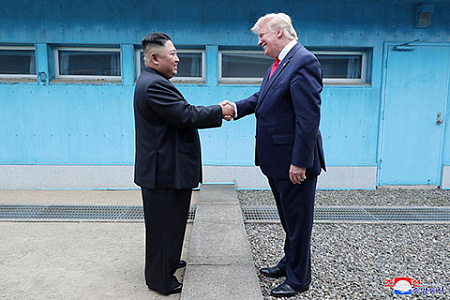
The White House has signaled President Donald Trump’s willingness to re-engage in dialogue with North Korean leader Kim Jong Un, a move that comes despite Pyongyang’s recent public rebuff. A North Korean representative at the United Nations reportedly refused to accept a letter from Trump intended for Kim, underscoring the deep freeze in communication between the two nations and the challenging path ahead for any renewed diplomatic efforts.
This latest overture follows a series of high-profile but ultimately fruitless summits between the two leaders in 2018, which took place in Singapore, Vietnam, and the Korean Demilitarized Zone. The negotiations stalled primarily over the issue of denuclearization. Observers in South Korea and beyond widely believe that Kim Jong Un has no intention of relinquishing his nuclear arsenal, a conviction hardened by what Pyongyang perceives as crucial lessons from conflicts in the Middle East, where nations without a nuclear deterrent have appeared vulnerable to foreign intervention.
Meanwhile, the Korean peninsula remains a stage for unconventional information warfare. Recently, South Korean police detained a group of American activists who were attempting to send 1,600 plastic bottles into North Korea from a border island. The bottles contained rice, miniature Bibles, US dollar bills, and USB drives with anti-war content, intended to float on the current to North Korean shores. This tactic is part of a broader, long-standing effort by activists and North Korean defectors who have also used large balloons to send anti-Pyongyang leaflets, South Korean media, and other items across the border.
These grassroots campaigns place the South Korean government in a difficult position. Seoul has cracked down on such activities, citing the need to ensure the safety of its citizens in border regions and to avoid provoking its volatile neighbor. This policy is part of a strategy aimed at reducing tensions and reviving long-dormant inter-Korean dialogue. In a sign of tentative de-escalation, propaganda broadcasts from loudspeakers on both sides of the border have ceased. However, these government restrictions clash with a South Korean Constitutional Court ruling that overturned a previous ban on sending leaflets, deeming it an excessive limitation on free speech.
Pyongyang’s strategic calculus is heavily influenced by broader global dynamics, particularly the ongoing tensions between the United States and Iran. North Korea has strongly condemned what it calls US aggression against Iran’s sovereignty, seeing a parallel to its own situation. The two countries, once labeled members of an “axis of evil” by former U.S. President George W. Bush, share a deep-seated distrust of Washington. While unconfirmed by Western intelligence, persistent reports of military and technological cooperation between Tehran and Pyongyang continue to cause alarm in the U.S. and among its allies.
Ultimately, despite Washington’s diplomatic feelers and Seoul’s efforts to manage tensions, North Korea’s response has been one of calculated silence. According to Konstantin Asmolov, a leading expert at the Russian Academy of Sciences’ Institute of China and Contemporary Asia, Pyongyang’s rhetoric on the Middle East has become nearly identical to Iran’s. He predicts Kim Jong Un will likely bide his time and remain silent on Trump’s proposals, waiting to see if they translate into concrete action, leaving the world to watch and wait for the next move in this high-stakes geopolitical standoff.
